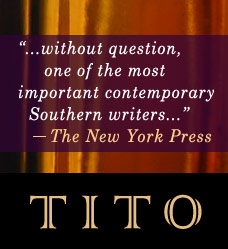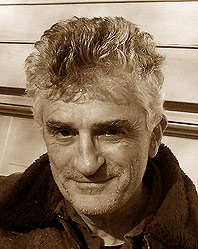



|
|
 |
Tito Perdue, America's Lost Literary Genius
By Jim Knipfel, New York Press
When people ask me to list my favorite authors, I don't offer up too many surprises—except when I mention Tito Perdue, whose name usually elicits little more than blank stares and puzzled shrugs. And that's just wrong.
I read Perdue's debut novel, Lee, when it was first published in 1991. Lee is a slim novel that tells the story of 70-year-old Lee Pefley, who, after many years, returns to the small Alabama town of his youth. There, he encounters the modern world—the new age, as he calls it—and Lee, a man who loves classical literature and despises mediocrity, doesn't much like what he finds. It was a sentence on page nine that hooked me for good:
"All his life he had wanted to identify what it was the masses most loathed, and then to see that they got it in spades."
Perdue's prose—and it's the prose that matters—was at once simple and rich, supremely intelligent, full of rage but under complete control. It was also funny as hell.
In 1994, Perdue released his next two novels—The New Austerities (in which a younger Lee—a paranoid insomniac with a bad case of kleptomania—leaves a white-collar job in New York, takes a nightmarish journey down the East Coast and settles on an arid, broken-down farm), and Opportunities in Alabama Agriculture (which focuses on Lee's grandfather, Ben—an idiot-savant who founds a postal system in a volcano-ravaged post-Civil War South). The writing had grown progressively textured and more savage—and I was thrilled to see that literature like this was still being written and more importantly, published.
After those three novels, however, there was silence. No more books came out, and Perdue himself seemed to have vanished. Maybe that's the way he wanted it. I didn't know. I didn't even know if he was still alive. When I found an address in Georgia that may or may not have been his, I wrote a letter.
A week later, I heard back. Mr. Perdue was, indeed, very much alive. Better still, he was writing. He'd always been writing, and had finished several manuscripts. However, he wrote, "my books have been failures from the financial point of view, and it's not likely that any more of them will appear."
Perdue was born in Chile (to American parents) in 1938. When the war broke out, they returned to the States, and Perdue grew up in Anniston, AL. He married his wife Judy when he was 18 (they're still together), earned degrees in English literature, European history and library science, then took work throughout the Midwest and Northeast as a bookkeeper, a library administrator and an apprentice insurance underwriter. In 1982, with his wife's encouragement, he retired to write full-time. They returned to the South ("Where I belong," he says), and that's what he's been doing ever since.
He's no fan of cities, Mr. Perdue—especially New York—yet this spring he and his wife were in Manhattan, in part to catch a performance of his favorite opera, Parsifal. We met for the very first time for drinks a few hours before the curtain went up.
In his mid-60s, Perdue is a tall, slim, well-dressed man, with owlish glasses, hair going gray at the temples and a powerful handshake. It's hard to detect the accent immediately, but once you catch it, he sounds like Faulkner—had Faulkner spent too much time up North. We sat at the bar, and Mr. Perdue ordered a strawberry daiquiri.
"I drink these sweet drinks," he explained, "because I can't stand the taste of liquors."
What was mostly on his mind that afternoon was the massive new novel he was working on—which might well, he believes, stretch to 2000 pages or more. The source material comes from a cache of old family papers he discovered about a year ago while cleaning out his mother's house. All his novels to date, he told me, have been very autobiographical. He figured it was time to write about someone else.
"When I was growing up, I always underrated my father, seriously. Underrated him as a human being. Then I came across these family papers that made me reconsider what kind of a person he was—and also other members of my family. So I owe this to my forebears. I've become kind of an ancestor-worshipper in my old age. And I'm going to do them justice in this big book. It's gonna have about 20 or 30 major protagonists. A big array of characters—including my grandfather, and uncles, grand-uncles and cousins."
The very first thing Perdue came across in this bundle of papers, remarkably enough, was an account written by his grandfather of a public hanging in 1888.
"They were executing a black man that he happened to know," he said. "He was supposed to stand there and watch them hang one of his dearest friends—but he couldn't watch that, so he left, and he didn't actually witness the execution. It wasn't a lynching," Perdue clarified. "The guy had been convicted of a murder, and this was simply a public hanging, which was common in those days.
"My grandfather was a tough old bird," he continued. "My father grew up in the most severe way imaginable. He was expected to work continuously. Never had any amusements. Grandfather was a puritan. He had four boys, and would discipline them in the harshest way. He used to use a buggy whip on them. Yet they all grew up, if not loving the old man, at least respecting him.
"As I write about him, I'm trying to show this callous nature of his on the one hand, and on the other hand, this great entrepreneurial strength that he had. He came from nowhere, had nothing, came from the poorest layers of society. He set up a timber company, had a saw mill, a brick mill, had a farm, raised all these children in the biggest house in town—he did this out of sheer strength of will—and he did it honestly.
"My father told me one time that the Ku Klux Klan came to [the grandfather's] house and wanted him to take part in some mischief they had in mind. He said, 'Just a minute, boys,' went and got his shotgun, and said, 'Now this is the only thing I've got to say to you.' He had the guts to buck the Klan in those days. That took a lot of moxie, and he had it."
The second piece of paper he came across in the family files detailed a duel his great-uncle got roped into.
"He was a very sensitive, high-strung man. He went to an opera in Montgomery one day. There was a lady in front of him who had some sort of a fancy hat on, and she wouldn't take it off—so he couldn't see the opera. He tapped on her shoulder and said, 'Pardon me, lady, but would you remove your hat?' The man with her turned around and slapped him right across the face, because he thought that his girlfriend had been insulted. That was an invitation to a duel. So they went outside—and my great-uncle did not have a pistol, so somebody ran to the nearest house and borrowed one. He didn't know how to shoot, but he was not going to back down. They had their duel right out there in front of the opera house, and my great-uncle shot the man right the smack home"—he pointed between his eyes—"and killed him dead as anything. Went back in and watched the rest of the opera."
He laughed, then told me that this same great-uncle later died of a broken heart after the second, and last, of his sons died.
"These are the kind of people that I have got to write about. I can't let that be forgotten."
Perdue told me that, apart from the big book, he had eight or nine finished manuscripts sitting in his closet at home. The only one I'd heard of was something called Morning Crafts—about Lee's adolescence—so I asked what a few of the others were like.
"In the last pages of Lee, he dies," he reminded me. "I have a book that takes up at that very moment, and pushes him through a purgatory-like place, where he's looking for his lost wife. It goes on for about 300 pages, one torment after another. It's like Dante's Inferno—it's just one hideous experience after another."
"I was talking to [John Gardner] one time, and he said, 'Tito, the function of good prose is to make you forget that you are reading, so that you're conscious only of what's happening.' I don't believe that's right. When you read the Old Testament, you are very conscious of the prose—in fact the prose is the main thing. I don't believe that prose should be translucent. I don't believe that plot is all that matters. I believe that language matters greatly. Would Gardner say that language doesn't matter in poetry? What I despise about contemporary literature is that the prose has no character. It's like a glass of water—it's not bad, but it's not memorable. There are no phrases that you remember. It has no corners or colors or shape to it. It's amorphous. But it does the job. It tells the story. But I don't care about the story. My books have very little plot. I don't even like plot."
In fact, a reliance on plot simply annoys him. "Life doesn't have a plot." Prose, he explains, is a much more difficult—and much more valuable—craft. Problem these days is that publishers don't always agree. I asked Perdue about this—and about his own take on being ignored by the industry.
"If you're a celebrity, you can easily find a ghostwriter and get your book published, make a lot of money. You may not be able to frame a proper English sentence, but you'll still have the notoriety. Judy's father was a novelist who wrote 20 novels in his lifetime—published two of them. Worked his ass off at a factory job for 40 years. Put in his 40 hours a week all those years, came home at night dog-tired, wrote his novels, got the first two published and then nothing for the rest of his life. He paid all the dues, made all the sacrifices."
It sounded too familiar.
"I have one advantage—I witnessed what happened to my father-in-law, so I was prepared for this, I was hardened to it. I never really expected anything, and I don't require it. My self-esteem does not depend on it, and I can live happily without it. I do have this compunction—this imperative—to write the damn things. And I'll rewrite them until I get them the way I want them. But if they're not published?... I don't suffer over it. I used to, I admit, when I was younger. It used to grieve me greatly that I couldn't get published. But I've published enough to know that being published is not an apotheosis."
Meanwhile, those first three novels are still available. I went back to them recently, and they're even more brilliant than I remembered. And Perdue is still writing—and for that I'm very happy.
There's a scene in Lee, where the protagonist, wielding a massive walking stick, bludgeons an insufferable youngster quite nearly to death. Each blow, Lee tells us, was made "on behalf of some great man the new age has ignored."
Sometimes, by God, it certainly is tempting.

|
|
|
 |















